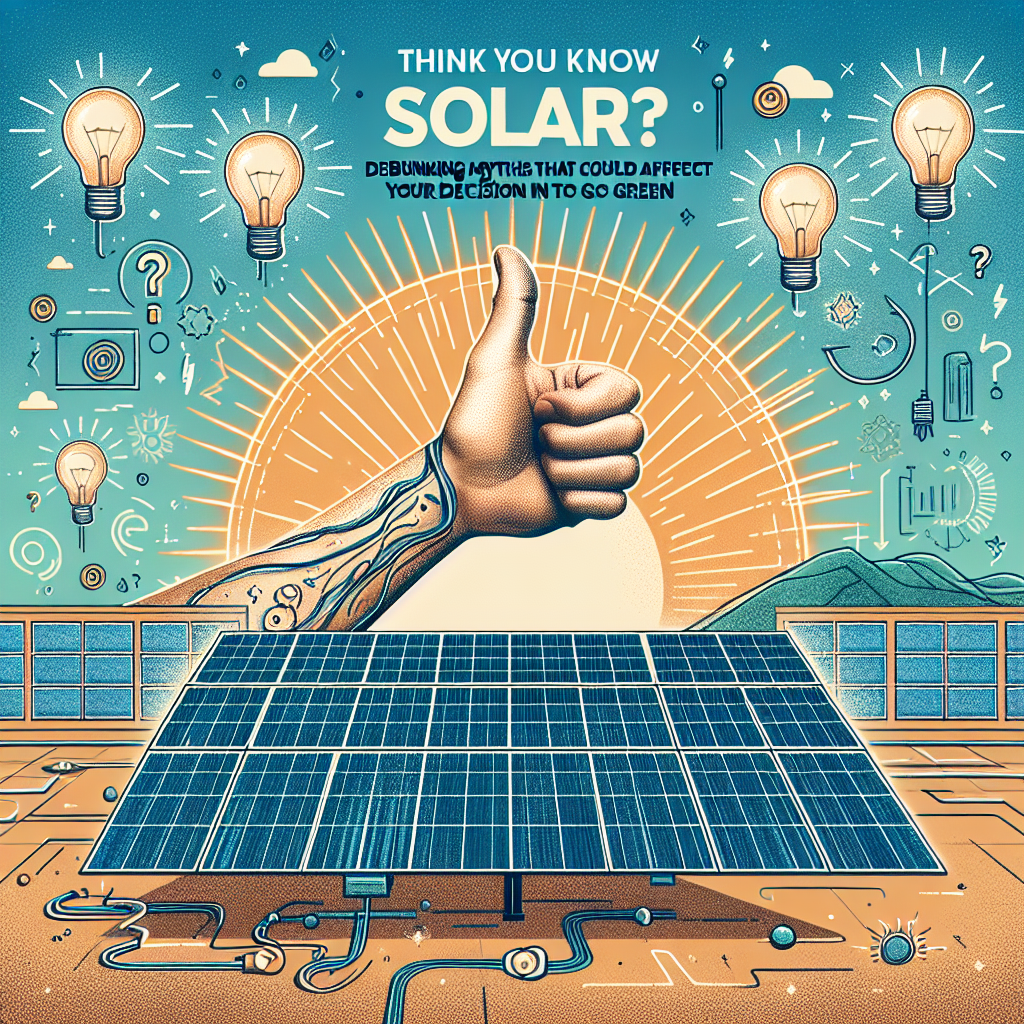As the world increasingly pushes toward sustainable energy solutions, solar power shines as a green alternative that can significantly reduce electricity bills and help combat climate change. However, misconceptions about solar energy often cloud public understanding, making it harder for potential users to make informed decisions. In this article, we’ll debunk some popular myths about solar energy that could impact your decision to go green.
Myth 1: Solar Panels Are Too Expensive
One of the biggest misconceptions about solar energy is the belief that installing solar panels is prohibitively expensive. While the upfront cost can be substantial, it’s essential to consider the long-term savings.
The Financial Benefits of Going Solar
Many states and municipalities offer incentives, rebates, and tax credits that significantly reduce the overall costs. Furthermore, the price of solar panels has dropped dramatically over the past decade, making solar energy more accessible than ever. When you factor in decreased electricity bills and potential income from selling excess energy back to the grid, the investment can pay for itself over time.
Myth 2: Solar Panels Only Work in Sunny Climates
While it’s true that solar panels produce the most energy on sunny days, they can still be effective in less sunny regions.
Understanding Solar Efficiency
Solar panels generate energy from daylight, not just direct sunlight. So even on cloudy days, they can still capture ambient light. Moreover, advances in technology have led to more efficient panels that can generate power in various lighting conditions. Many successful solar installations exist even in regions known for rainy weather.
Myth 3: Solar Energy Requires Too Much Maintenance
Some people believe that solar panels are high-maintenance and require constant upkeep. While any energy system requires some level of care, solar panels are relatively low-maintenance.
Easy Maintenance: What to Expect
Most manufacturers offer warranties of 20 to 25 years, and regular maintenance typically involves simply keeping the panels clean. In most cases, rain will wash away dirt and debris. For some homeowners, hiring a service to clean solar panels once a year is sufficient.
Myth 4: Solar Energy Is Bad for the Environment
You might hear that the production of solar panels is harmful to the environment and that they contribute to pollution. While the production process does have some environmental impact, it’s crucial to weigh that against the long-term benefits of using clean energy.
The Larger Environmental Picture
Once installed, solar panels generate energy without emissions, providing a sustainable energy source. Studies have shown that the overall life cycle emissions of solar energy are significantly lower than those associated with fossil fuels. So, while production does have a footprint, the long-term environmental benefits far outweigh the initial consequences.
Myth 5: You Need a Perfect Roof to Go Solar
Many potential solar users think they need a perfect south-facing roof for solar panels to work effectively. While an ideal roof can certainly optimize performance, it isn’t a strict requirement.
Alternatives to Traditional Roof Installations
There are multiple options available, such as ground-mounted systems or solar canopies, that can circumvent roof-related concerns. Additionally, technology is improving, and many solar companies can recommend solutions that fit less-than-ideal rooftops or lot configurations.
Myth 6: You Can’t Go Solar If You Live in a Rental
Renters often believe they cannot take advantage of solar energy, assuming it’s reserved only for homeowners. However, there are several pathways for renters to access solar power.
Solar Options for Renters
Community solar projects allow individuals to buy into shared solar energy installations, and power purchase agreements (PPAs) enable renters to switch to green energy sources without installing panels themselves. As the market evolves, more flexible options continue to develop.
The Final Word: Your Journey Toward Going Green
As we’ve debunked these myths, it’s clear that solar energy can be a powerful and practical choice for many people. Making the decision to go green is not just about installing solar panels; it’s a commitment to a sustainable lifestyle. If you’re considering this shift, take the time to research, consult with industry experts, and understand your options.
Remember, the journey toward sustainable living is a collective one, and every step you take has a significant impact. As you think about solar energy, aim to stay informed, be open to new ideas, and embrace the benefits of a greener future. By exploring these myths and uncovering the truth, you’re one step closer to making an empowered decision that benefits you and the planet.
By fostering a deeper understanding of solar power’s potential, together, we can pave the way towards a cleaner, more sustainable tomorrow—one solar panel at a time.


